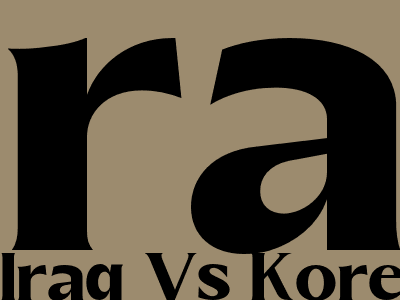
Iraq Vs Korea
Iraq Vs Korea: A Comprehensive Analysis of Their Economic and Political Landscapes
Economic Landscape
Iraq's economy is heavily dependent on oil exports, accounting for over 90% of government revenue. However, due to geopolitical instability and fluctuating oil prices, Iraq's economy has faced significant challenges in recent years. In contrast, South Korea has a diversified economy driven by industries such as technology, manufacturing, and services. South Korea has achieved sustained economic growth, reducing poverty and increasing living standards.
Iraq's Economic Challenges
- Reliance on oil exports reduces economic diversification. - Geopolitical instability and conflict disrupt economic activity. - Fluctuating oil prices impact government revenue and economic growth.
South Korea's Economic Success
- Diversified economy with a focus on technology and manufacturing. - Stable political environment fosters investment and economic growth. - International trade and exports contribute to economic success.
Political Landscape
Iraq's political system is characterized by sectarian divisions and a centralized government. Since the 2003 U.S.-led invasion, Iraq has struggled with political instability and violence. South Korea, on the other hand, has a democratic political system with a strong emphasis on civil liberties and human rights. South Korea has experienced peaceful transitions of power and is considered a stable democracy in the region.
Iraq's Political Challenges
- Sectarian divisions and violence hinder political stability. - Centralized government with limited local autonomy. - Corruption and lack of transparency in government operations.
South Korea's Political Stability
- Democratic political system with regular elections. - Strong civil liberties and human rights protections. - Decentralized government with local autonomy.
Comparison in Tabular Form
| Feature | Iraq | South Korea | |---|---|---| | Economic Dependence | Oil exports | Diversified economy | | Economic Growth | Fluctuating | Sustained | | Political System | Sectarian divisions, centralized | Democratic, stable | | Political Stability | Challenges, violence | Peaceful transitions, democracy | | Human Rights | Concerns | Strong protections |
Conclusion
Iraq and South Korea, despite their geographic proximity, present contrasting economic and political landscapes. Iraq's oil-dependent economy and political instability have hindered its development, while South Korea's diversified economy and democratic political system have contributed to its success. Understanding these differences is crucial for assessing the potential and challenges faced by each country in navigating the complexities of the modern world.
Komentar